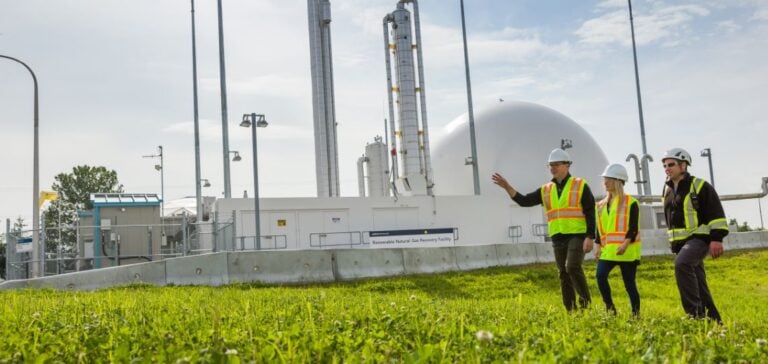Hydron Energy Inc., a company specializing in gas treatment solutions, has signed a collaboration agreement with FortisBC Energy Inc. to evaluate the use of its INTRUPTor™ system at sites in British Columbia. This collaboration focuses on integrating biogas treatment technologies to produce renewable natural gas (RNG).
Overview of the INTRUPTor™ Technology
The INTRUPTor™ system is based on an intensive processing platform designed to convert raw gases into RNG, achieving a 99.8% biomethane recovery rate. This solution operates under ambient conditions and eliminates the need for feed compressors, vacuum pumps, or exhaust gas post-treatment systems, reducing operating and capital costs by up to 50%.
The technology is suited for biogas treatment facilities with capacities ranging from 100 to 3,800 Nm³/h. A mobile version is also available for smaller or remote setups.
Objectives of the Collaboration
The agreement between Hydron Energy and FortisBC aims to assess the feasibility of using the INTRUPTor™ system at various sites, including wastewater treatment plants, anaerobic digesters, and landfills. FortisBC, a major player in the development of energy infrastructure in British Columbia, seeks to diversify and optimize its RNG supply chain.
Joe Mazza, Vice President of Energy Supply and Resource Development at FortisBC, stated: “This collaboration will allow us to test new technological approaches and improve our ability to integrate more cost-effective gas treatment solutions into our network.”
Opportunities for Industry Stakeholders
This initiative is part of a strategy to increase local RNG production capabilities by leveraging advanced technologies. Hydron Energy targets markets where existing infrastructure requires scalable and cost-efficient solutions.
Craig Bond, Director of Sales and Business Development at Hydron Energy, noted that this collaboration offers an opportunity to adapt their system to the specific needs of the identified sites in British Columbia.
The project, currently in its evaluation phase, could lead to a broader deployment of the INTRUPTor™ technology in the region.






















